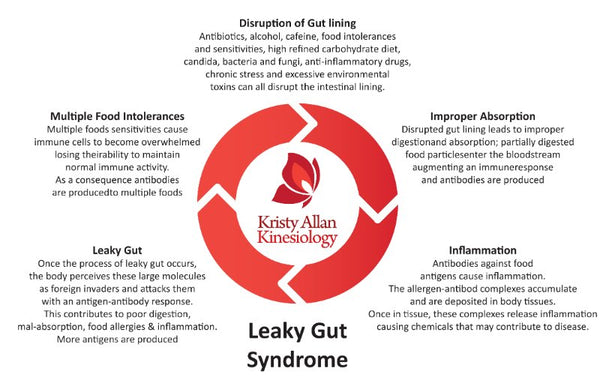Offer
Provide additional details about the offer you're running.


The gut is the gateway to health. If your gut is healthy, chances are that you're in good health. However, there's a condition called leaky gut that can lead to a host of health problems.
"Leaky gut syndrome" is said to have symptoms including bloating, gas, cramps, food sensitivities, and aches and pains. But it's something of a medical mystery.
From an MD’s standpoint, it’s a very gray area,” says gastroenterologist Donald Kirby, MD, director of the Center for Human Nutrition at the Cleveland Clinic. “Physicians don’t know enough about the gut, which is our biggest immune system organ.”
"Leaky gut syndrome" isn't a diagnosis taught in medical school. Instead, "leaky gut really means you’ve got a diagnosis that still needs to be made,” Kirby says. “You hope that your doctor is a good-enough Sherlock Holmes, but sometimes it is very hard to make a diagnosis.”
“We don’t know a lot but we know that it exists,” says Linda A. Lee, MD, a gastroenterologist and director of the Johns Hopkins Integrative Medicine and Digestive Center. “In the absence of evidence, we don’t know what it means or what therapies can directly address it.”
A possible cause of leaky gut is increased intestinal permeability or intestinal hyperpermeability.
That could happen when tight junctions in the gut, which control what passes through the lining of the small intestine, don't work properly. That could let substances leak into the bloodstream.
People with celiac disease and Crohn’s disease experience this. “Molecules can get across in some cases, such as Crohn’s, but we don’t know all the causes,” Lee says. Whether hyperpermeability is more of a contributing factor or a consequence is unclear."
But why or how this would happen in someone without those conditions is not clear.
Little is known about other causes of leaky gut that aren't linked to certain types of drugs, radiation therapy, or food allergies.
Leaky gut symptoms aren't unique. They're shared by other problems, too. And tests often fail to uncover a definite cause of the problem. That can leave people without a diagnosis and, therefore, untreated.
It’s crucial, Kirby says, to find a doctor who will take time with you and take your concerns seriously.
“You may have leaky gut and we may be able to treat what causes it,” Kirby says. “If you have something going on, it is incumbent upon the medical community to listen to you.”
Unfortunately, Lee says, not all doctors make the effort to get at the root of the problem, and that’s what frequently sends patients to alternative practitioners.
“Often, the reason they have resorted to alternative medicine is because of what they have been told and how they have been treated by other practitioners,” Lee says. “We need to listen.”
In her clinic, Lee combines conventional medicine with evidenced-based complementary therapies. But with leaky gut, she says, the evidence -- about what causes it and how to treat it -- has yet to fully accumulate.
We are in the infancy of understanding what to do,” Lee says. “People who are making claims about what to do are doing so without evidence.”
For example, many web sites offering information on leaky gut, recommend taking L-glutamine supplements to strengthen the lining of the small intestine. Lee says that, theoretically, that makes sense, given glutamine’s role in intestinal function -- but there is no research to back up such claims.
“There’s no evidence that if I give you a pile of glutamine pills, that you will improve,” Lee says.
Treating the underlying condition, such as Crohn’s or celiac disease, will often resolve symptoms associated with the condition. But without a firm diagnosis, a doctor's hands are often tied by a lack of evidence.
Diet likely plays a big role in having a leaky gut, Lee and Kirby agree. So if you have symptoms of leaky gut, you would do well to see a gastroenterologist who is also trained in nutrition.
Chronic stress may also be a factor, Lee says. “You need to tend to your stress, whether through medication or meditation. That’s what you need to focus on.”
Lee says that lifestyle modifications, such as those that reduce stress and improve the diet, may be among the best ways to treat leaky gut, particularly when no underlying condition is identified. “Chronic health problems are so often due to lifestyle, and we don’t have pills for those,” she says. “We’re talking about the way we live and the way we eat.”
The gut is naturally permeable to very small molecules in order to absorb these vital nutrients. In fact, regulating intestinal permeability is one of the basic functions of the cells that line the intestinal wall. In sensitive people, gluten can cause the gut cells to release zonulin, a protein that can break apart tight junctions in the intestinal lining. Other factors — such as infections, toxins, stress and age — can also cause these tight junctions to break apart.
Once these tight junctions get broken apart, you have a leaky gut. When your gut is leaky, things like toxins, microbes, undigested food particles, and more can escape from your intestines and travel throughout your body via your bloodstream. Your immune system marks these "foreign invaders" as pathogens and attacks them. The immune response to these invaders can appear in the form of any of the nine signs you have a leaky gut, which are listed below.
The main culprits are foods, infections, and toxins.
Gluten is the number one cause of leaky gut.
Other inflammatory foods like dairy or toxic foods, such sugar and excessive alcohol, are suspected as well.
The most common infectious causes are candida overgrowth, intestinal parasites, and small intestine bacterial overgrowth (SIBO).
Toxins come in the form of medications, like Motrin, Advil, steroids, antibiotics, and acid-reducing drugs, and environmental toxins like mercury, pesticides and BPA from plastics.
Stress and age also contribute to a leaky gut.

if you suffer from any of the following conditions, it’s likely that you have a leaky gut:
1. Digestive issues such as gas, bloating, diarrhea or irritable bowel syndrome (IBS).
2. Seasonal allergies or asthma.
3. Hormonal imbalances such as PMS or PCOS.
4. Diagnosis of an autoimmune disease such as rheumatoid arthritis, Hashimoto’s thyroiditis, lupus, psoriasis, or celiac disease.
5. Diagnosis of chronic fatigue or fibromyalgia.
6. Mood and mind issues such as depression, anxiety, ADD or ADHD.
7. Skin issues such as acne, rosacea, or eczema.
8. Diagnosis of candida overgrowth.
9. Food allergies or food intolerances.
In my practice, I have all of my patients follow The Myers Way comprehensive elimination diet, which removes the toxic and inflammatory foods for a certain period of time. In addition, I have them follow a 4R program to heal their gut. The 4R program is as follows.
1. Remove.
Remove the bad. The goal is to get rid of things that negatively affect the environment of the GI tract, such as inflammatory and toxic foods, and intestinal infections.
2. Replace.
Replace the good. Add back the essential ingredients for proper digestion and absorption, such as digestive enzymes, hydrochloric acid and bile acids.
3. Reinoculate.
It’s critical to restore beneficial bacteria to reestablish a healthy balance of good bacteria. (see magnified image below of Gut Bacteria)
4. Repair.
It’s essential to provide the nutrients necessary to help the gut repair itself. One of my favorite supplements is L-glutamine, an amino acid that helps to rejuvenate the lining of the gut wall.